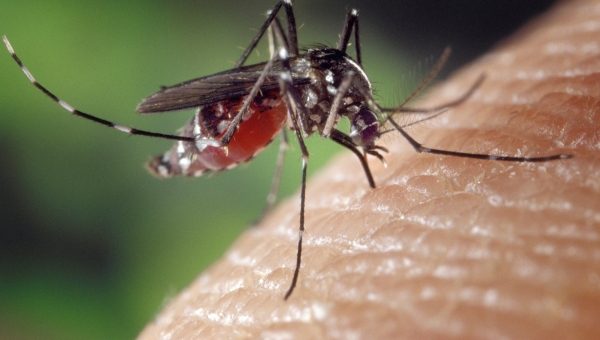10
Oct
Insecticide-Resistant Mosquito Sets Africa’s Malaria Fight Back to Square One

(Beyond Pesticides, October 10, 2023) In recent years, the effects of climate change have become more frequent and more severe, from extreme weather events to rising sea levels. But perhaps one of the most insidious consequences of a warming planet is the way it influences the spread of diseases, often hitting marginalized communities the hardest. This is no more evident than in the case of malaria, where the disease transmission through the Anopheles stephensi mosquito serves as a dire warning of the challenges caused by a changing climate. As this deadly vector of disease expands its territory, it is clear that pesticide-intensive approaches are poorly equipped to cope with the threat as insect resistance to chemical controls steadily grows.
Native to South Asia, the Anopheles stephensi mosquito has been on a relentless journey, crossing continents from the Arabian Peninsula to East Africa and deeper into the African continent. The mosquito’s ability to quickly adapt to new environments, bolstered by shifting climate patterns, illustrates how global warming affects disease vectors. Matthew Thomas, PhD, emphasizes, “Anopheles stephensi has higher thermal tolerance and a capacity to transmit at higher temperatures than Anopheles gambiae [another malaria-spreading mosquito]. This is significant when considering climate change and the invasion of this species into Africa, potentially altering the dynamics and distribution of malaria.”
While scientists have not yet pinpointed the exact cause of An. stephensi’s migration across Arabia and Africa, climate change cannot be ruled out. The mosquito’s tolerance for heat strongly suggests that a changing climate may be entirely or partly responsible for its expansion.
The consequences of An. stephensi’s migration are nothing short of catastrophic, arriving at a time when malaria was on the verge of eradication in Africa. In 2012, Djibouti, a nation on the brink of declaring malaria eliminated, reported just 27 cases. However, with the mosquito’s invasion, cases increased exponentially. By 2020, Djibouti faced over 70,000 reported cases, primarily concentrated in the capital, Djibouti city.
The rapid spread of this mosquito can be attributed to its unique characteristics not found in other African Anopheles species. While most mosquitoes become problematic during rainy and wet seasons, typically residing in rural areas and natural water sources, An. stephensi thrives year-round. Its preference for artificial water containers, such as cisterns, water containers, and wells, enables it to breed continuously despite seasonal fluctuations. This allows for adaptability to even urban environments—something unheard of in other African mosquito species–and human-made water reservoirs, which poses a significant challenge to malaria control efforts.
An. stephensi is also unique in that it is not merely a carrier of one malaria parasite; it transmits two malaria-causing parasites–Plasmodium falciparum and Plasmodium vivax —increasing its potency and likelihood of spreading disease. Unlike most mosquitoes that feed at night when preventive measures like bed nets are effective, An. stephensi feeds during the day. This behavioral shift renders traditional prevention strategies less effective, placing communities at an elevated risk of malaria transmission.
Perhaps one of the most significant concerns is the insecticide resistance exhibited by these mosquitoes. A study has revealed that “pyrethroid resistance is now widespread in most malaria-endemic countries, threatening the efficacy of standard long-lasting insecticide nets treated with pyrethroids alone.”
The same pyrethroids have been employed to tackle mosquito-related public health concerns since 1977. Half a century later, the efficacy of this class of insecticide has dwindled, with insecticide-resistant mosquitos present and wreaking havoc across the globe.
The production and application of these insecticides are intrinsically linked to fossil fuels, contributing to greenhouse gas emissions. The irony of this cycle cannot be ignored–the very pesticides intended to combat disease vectors contribute to the environmental factors propelling malaria’s spread.
This resurgence of malaria serves as a stark reminder of the urgent need to reevaluate the reliance on pesticides. The methods employed to combat malaria might inadvertently be worsening the crisis. For public health advocates, this serves as a wake-up call, compelling the world to reassess strategies in the face of climate change.
This situation is fundamentally an environmental justice issue. The resurgence of malaria predominantly affects developing countries that lack the infrastructure to support the health care needs during urban malaria outbreaks. For so long, malaria has primarily affected rural communities. As urban areas become increasingly susceptible to malaria due to climate change, countless lives will be lost due to the almost nonexistent malaria identification and treatment know-how. In fact, a study estimated 126 million additional people in urban areas would be at risk of malaria because of the An. stephensi mosquito. Moreover, the efforts of under-resourced nations to eradicate malaria and other life-threatening diseases are being undermined by the actions of those manufacturing petrochemical pesticides, exacerbating climate change and the migration of invasive species.
The impact of a single invasive vector species has already resulted in millions of illnesses and death. The world must take action to address the harm caused by climate change and regain control before more dangerous invasive species further affect vulnerable populations. Beyond Pesticides is committed to providing ecological and just solutions to pest problems. Our Mosquito Management and Insect-Borne Diseases guide offers alternative mosquito control options that are better for public health and the environment. Exploring and supporting such alternatives is crucial in a world threatened by dire climate catastrophes. Please visit the Beyond Pesticides webpage to learn about more alternatives to pesticides.
All unattributed positions and opinions in this piece are those of Beyond Pesticides.










